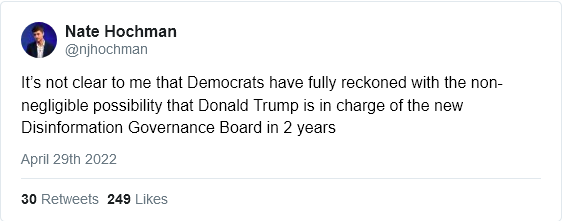 Socialism is usually defined as “common ownership of the means of production”. Crudely: the State, representing the whole nation, owns everything, and everyone is a State employee. This does not mean that people are stripped of private possessions such as clothes and furniture, but it does mean that all productive goods, such as land, mines, ships and machinery, are the property of the State. The State is the sole large-scale producer. It is not certain that Socialism is in all ways superior to capitalism, but it is certain that, unlike capitalism, it can solve the problems of production and consumption. At normal times a capitalist economy can never consume all that it produces, so that there is always a wasted surplus (wheat burned in furnaces, herrings dumped back into the sea, etc., etc.) and always unemployment. In time of war, on the other hand, it has difficulty in producing all that it needs, because nothing is produced unless someone sees his way to making a profit out of it. In a Socialist economy these problems do not exist. The State simply calculates what goods will be needed and does its best to produce them. Production is only limited by the amount of labour and raw materials. Money, for internal purposes, ceases to be a mysterious all-powerful thing and becomes a sort of coupon or ration-ticket, issued in sufficient quantities to buy up such consumption goods as may be available at the moment.
Socialism is usually defined as “common ownership of the means of production”. Crudely: the State, representing the whole nation, owns everything, and everyone is a State employee. This does not mean that people are stripped of private possessions such as clothes and furniture, but it does mean that all productive goods, such as land, mines, ships and machinery, are the property of the State. The State is the sole large-scale producer. It is not certain that Socialism is in all ways superior to capitalism, but it is certain that, unlike capitalism, it can solve the problems of production and consumption. At normal times a capitalist economy can never consume all that it produces, so that there is always a wasted surplus (wheat burned in furnaces, herrings dumped back into the sea, etc., etc.) and always unemployment. In time of war, on the other hand, it has difficulty in producing all that it needs, because nothing is produced unless someone sees his way to making a profit out of it. In a Socialist economy these problems do not exist. The State simply calculates what goods will be needed and does its best to produce them. Production is only limited by the amount of labour and raw materials. Money, for internal purposes, ceases to be a mysterious all-powerful thing and becomes a sort of coupon or ration-ticket, issued in sufficient quantities to buy up such consumption goods as may be available at the moment.
However, it has become clear in the last few years that “common ownership of the means of production” is not in itself a sufficient definition of Socialism. One must also add the following: approximate equality of incomes (it need be no more than approximate), political democracy, and abolition of all hereditary privilege, especially in education. These are simply the necessary safeguards against the reappearance of a class-system. Centralized ownership has very little meaning unless the mass of the people are living roughly upon an equal level, and have some kind of control over the government. “The State” may come to mean no more than a self-elected political party, and oligarchy and privilege can return, based on power rather than on money.
But what then is Fascism?
Fascism, at any rate the German version, is a form of capitalism that borrows from Socialism just such features as will make it efficient for war purposes. Internally, Germany has a good deal in common with a Socialist state. Ownership has never been abolished, there are still capitalists and workers, and – this is the important point, and the real reason why rich men all over the world tend to sympathize with Fascism – generally speaking the same people are capitalists and the same people workers as before the Nazi revolution. But at the same time the State, which is simply the Nazi Party, is in control of everything. It controls investment, raw materials, rates of interest, working hours, wages. The factory owner still owns his factory, but he is for practical purposes reduced to the status of a manager. Everyone is in effect a State employee, though the salaries vary very greatly. The mere efficiency of such a system, the elimination of waste and obstruction, is obvious. In seven years it has built up the most powerful war machine the world has ever seen.
But the idea underlying Fascism is irreconcilably different from that which underlies Socialism. Socialism aims, ultimately, at a world-state of free and equal human beings. It takes the equality of human rights for granted. Nazism assumes just the opposite. The driving force behind the Nazi movement is the belief in human inequality, the superiority of Germans to all other races, the right of Germany to rule the world. Outside the German Reich it does not recognize any obligations. Eminent Nazi professors have “proved” over and over again that only Nordic man is fully human, have even mooted the idea that non-Nordic peoples (such as ourselves) can interbreed with gorillas! Therefore, while a species of war-Socialism exists within the German state, its attitude towards conquered nations is frankly that of an exploiter. The function of the Czechs, Poles, French, etc., is simply to produce such goods as Germany may need, and get in return just as little as will keep them from open rebellion. If we are conquered, our job will probably be to manufacture weapons for Hitler’s forthcoming wars with Russia and America. The Nazis aim, in effect, at setting up a kind of caste system, with four main castes corresponding rather closely to those of the Hindu religion. At the top comes the Nazi party, second come the mass of the German people, third come the conquered European populations. Fourth and last are to come the coloured peoples, the “semi-apes” as Hitler calls them, who are to be reduced quite openly to slavery.
However horrible this system may seem to us, it works. It works because it is a planned system geared to a definite purpose, world-conquest, and not allowing any private interest, either of capitalist or worker, to stand in its way. British capitalism does not work, because it is a competitive system in which private profit is and must be the main objective. It is a system in which all the forces are pulling in opposite directions and the interests of the individual are as often as not totally opposed to those of the State.
George Orwell, “The Lion And The Unicorn: Socialism and the English Genius”, 1941-02-19.






